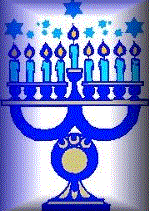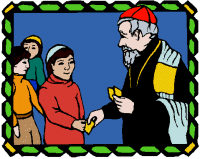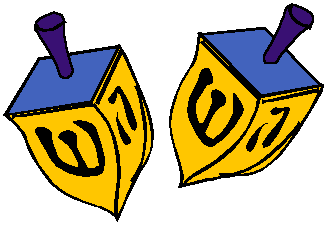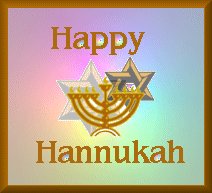|
Chanukah
Chanukah, the Jewish festival of rededication, also known as the festival of lights, is an eight day
festival beginning on the 25th day of the Jewish month of Kislev.
Chanukah is probably one of the best known Jewish holidays, not because of any great religious
significance, but because of its proximity to Christmas. Many non-Jews (and even many assimilated
Jews!) think of this holiday as the Jewish Christmas, adopting many of the Christmas customs, such as
elaborate gift-giving and decoration. It is bitterly ironic that this holiday, which has its roots in a
revolution against assimilation and the suppression of Jewish religion, has become the most assimilated,
secular holiday on the Jewish calendar.
The story of Chanukah begins in the reign of Alexander the Great. Alexander conquered Syria, Egypt
and Palestine, but allowed the lands under his control to continue observing their own religions and
retain a certain degree of autonomy. Under this relatively benevolent rule, many Jews assimilated
much of Hellenistic culture, adopting the language, the customs and the dress of the Greeks, in much
the same way that Jews in America today blend into the secular American society.
More than a century later, a successor of Alexander, Antiochus IV was in control of the region. He
began to oppress the Jews severely, placing a Hellenistic priest in the Temple, massacring Jews,
prohibiting the practice of the Jewish religion, and desecrating the Temple by requiring the sacrifice of
pigs (a non-kosher animal) on the altar. Two groups opposed Antiochus: a basically nationalistic group
led by Mattathias the Hasmonean and his son Judah Maccabee, and a religious traditionalist group
known as the Chasidim, the forerunners of the Pharisees (no direct connection to the modern
movement known as Chasidism). They joined forces in a revolt against both the assimilation of the
Hellenistic Jews and oppression by the Selucid Greek government. The revolution succeeded and the
Temple was rededicated.
| According to tradition as recorded in the Talmud, at the time of the rededication, there was very little oil left that had not been defiled by the Greeks. Oil was needed for the menorah (candelabrum) in the Temple, which was supposed to burn throughout the night every night. There was only enough oil to burn for one day, yet miraculously, it burned for eight days, the time needed to prepare a fresh supply of oil for the menorah. An eight day festival was declared to commemorate this miracle. Note that the holiday commemorates the miracle of the oil, not the military victory: Jews do not glorify war. |

|
Chanukah's religious significance is far less than
that of Rosh Hashanah, Yom Kippur, Sukkot, Passover, and Shavu'ot. It is roughly equivalent to Purim
in significance, and you won't find many non-Jews who have even heard of Purim! Chanukah is not
mentioned in Jewish scripture; the story is related in the book of Maccabbees, which Jews do not
accept as scripture.
|
The On-Line Menorah |
The only religious observance related to the holiday is the lighting of
candles. |
The candles are arranged in a candelabrum called a menorah (or sometimes called a chanukkiah) that holds nine candles: one for each
night, plus a shammus (servant) at a different height. On the first night,
one candle is placed at the far right. The shammus candle is lit and three
berakhot (blessings) are recited: l'hadlik neir (a general prayer over candles), she-asah nisim (a prayer thanking G-d for performing miracles
for our ancestors at this time), and she-hekhianu (a general prayer thanking G-d for allowing us to reach this time of year). See Chanukah
Candle Lighting Blessings for the full text of these blessings. After
reciting the blessings, the first candle is then lit using the shammus candle, and the shammus candle is placed in its holder. The candles are
allowed to burn out on their own after a minimum of 1/2 hour. Each night, another candle is added
from right to left (like the Hebrew language). Candles are lit from left to right (because you pay honor
to the newer thing first). On the eighth night, all nine candles (the 8 Chanukah candles and the
shammus) are lit.
Why the shammus candle? The Chanukah candles are for pleasure only; we are not allowed to use
them for any productive purpose. We keep an extra one around (the shammus), so that if we need to
do something useful with a candle, we don't accidentally use the Chanukah candles. The shammus
candle is at a different height so that it is easily identified as the shammus.
It is traditional to eat fried foods on Chanukah because of the significance of oil to the holiday.
Among Ashkenazic Jews, this usually includes latkes (pronounced "lot-kuhs" or "lot-keys" depending
on where your grandmother comes from. Pronounced "potato pancakes" if you are a goy.)
Some recipes are included later in this page.

|
Gift-giving is not a traditional part of the holiday, but has been added in places where Jews have a lot
of contact with Christians, as a way of dealing with our children's jealousy of their Christian friends. It
is extremely unusual for Jews to give Chanukah gifts to anyone other than their own young children.
The only traditional gift of the holiday is "gelt," small amounts of money. |

|

|
The Dreidel Game |
Another tradition of the holiday is playing dreidel, a gambling game played with a square top. Most
people play for matchsticks, pennies, M&Ms or chocolate coins. A dreidel is marked with four
Hebrew letters: Nun, Gimmel, Heh and Shin. |
|
This supposedly stands for the Hebrew phrase "nes gadol hayah
sham", a great miracle happened there. Actually, it stands for the
Yiddish words nit (nothing), gantz (all), halb (half) and shtell (put),
which is the rules of the game! There are some variations in the way people play the game, but the way
some people play, everyone puts in
one coin. A person spins the dreidel. On Nun, nothing happens; on Gimmel
(some kids call it "gimme!"), you get the whole pot; on Heh, you get half of the pot;
and on Shin, you put one in. When the pot is empty, everybody puts one in. Keep playing until one
person has everything. Then redivide it, because nobody likes a poor winner.
|

|

The Night Before Chanukah
'Twas the night before Chanukah, boichiks and maidels
Not a sound could be heard, not even the dreidels
The menorah was set by the chimney alight
In the kitchen, the Bubbie was hopping a bite
Salami, Pastrami, a glaisele tay
And zoyere pickles mit bagels-- Oy vay!
Gezint and geschmock the kinderlach felt
While dreaming of taiglach and Chanukah gelt
The alarm clock was sitting, a kloppin' and tickin'
And Bubbie was carving a shtickele chicken
A tummel arose, like the wildest k'duchas
Santa had fallen right on his tuchas!
I put on my slippers, ains, tzvay, drei
While Bubbie was eating herring on rye
I grabbed for my bathrobe and buttoned my gottkes
And Bubbie was just devouring the latkes
To the window I ran, and to my surprise
A little red yarmulka greeted my eyes.
When he got to the door and saw the menorah
"Yiddishe kinder," he cried, "Kenahorah!"
I thought I was in a Goyishe hoise!
As long as I'm here, I'll leave a few toys."
"Come into the kitchen, I'll get you a dish
Mit a gupel, a leffel, and a shtickele fish."
With smacks of delight he started his fressen
Chopped liver, knaidlach, and kreplach gegessen
Along with his meal he had a few schnapps
When it came to eating, this boy sure was tops
He asked for some knishes with pepper and salt
But they were so hot he yelled out "Gevalt!"
He loosened his hoysen and ran from the tish
"Your koshereh meals are simply delish!"
As he went through the door he said "See y'all later
I'll be back next Pesach in time for the seder!"
So, hutzmir and zeitzmir and "Bleibtz mir gezint"
he called out cheerily into the wind.
More rapid than eagles, his prancers they came
As he whistled and shouted and called them by name
"Come, Izzie, now Moishe, now Yossel and Sammy!
On Oyving, and Maxie, and Hymie and Manny!"
He gave a geshrai, as he drove out of sight
"A gut yontiff to all, and to all a good night!"
Anon

Recipe for Latkes
4 medium potatoes
1 medium onion
1/2 bell pepper*
2 eggs
2 tbs. parsley*
3/4 cup matzah meal (flour or bread crumbs can be substituted)
salt and black pepper to taste
vegetable oil
Shred the potatoes, onion and bell pepper into a large bowl. Press out all excess liquid. Add eggs and
parsley and mix well. Add matzah meal gradually while mixing until the batter is doughy, not too dry.
(you may not need the whole amount, depending on how well you drained the veggies). Add a few
dashes of salt and black pepper. (don't taste the batter -- it's really gross!). Don't worry if the batter
turns a little orange; that will go away when it fries.
Heat about 1/2 inch of oil to a medium heat. Form the batter into thin patties about the size of your
palm. Fry batter in oil. Be patient: this takes time, and too much flipping will burn the outside without
cooking the inside. Flip when the bottom is golden brown.
Place finished latkes on paper towels to drain. Eat hot with sour cream or applesauce. They reheat
OK in a microwave, but not in an oven unless you cook them just right.
*The peppers and parsley are not traditional.


| A variety of latkes, as well as full menus for
Sephardic, Italian, and Family Hanukkah dinners. From Bon Appetit. |
Chanukah
Menus |

|
Chanukah Festivities |
Help celebrate and learn about the feast of Chanukah,
courtesy of a user-friendly Web site that blends |
together spirituality with children's stories, e-cards,
audio/video, history and how-to guides.

| The Roman
characters of the English alphabet don't help much if you're
composing documents or Web pages in Hebrew. Download this font to
avoid miscommunication when translating Hebrew into English, so
you can present your documents the way you want. |
Hebrew
Font |

|
Chanukah
Desktop Theme |
Two
beautifully done desktop themes will bring Chanukah to your
desktop. Including themes for |
Dreidel and Festival of Lights, this
download gives you wallpaper, icons, animated and regular
cursors, sounds, start-up and shutdown screens, and a font.

Listen to Chanukah Music
Lyrics
to Chanukah Music

Virtual
Chanukah 99

The
Chanukah Kid's Club

From Flames to Heaven: New Psalms for Healing & Praise
by Debbie Perlman
Eight Psalms for Chanukah: One for Each Night
by Deborah M. Perlman
Ms. Perlman writes: "In the tradition of King David, I write words of praise
and comfort, many inspired by the experiences of friends, fellow congregants,
and acquaintances. A twenty year cancer survivor, I am disabled by
the side effects of treatment, and use oxygen and a wheelchair.
My cycle of psalms for Chanukah was originally written and posted
on the Internet as part of a Chanukah Tzedakkah project of the
Judaism section of the Compuserve religion forum. The psalms can
be read as part of the Chanukah candle-lighting ceremony.
Sixty-Three: A Counting Hallel for Chanukah can be divided, with a
stanza and its two-line response read and discussed each night.
One Hundred Forty-One was
written for last year’s Shabbat Chanukah at
Beth Emet."
First Night
Brief brave light,
Guarding against the deepest dark;
One finger of Your hand
To guide us through winter’s cold.
So long we struggled,
Hidden in stony hills,
Hidden in the valley of our fears,
Afraid of what the light might reveal.
Too long we huddled, hiding,
Pushing away Your hand,
Denying our birth heritage,
Afraid of bringing forth our own light.
Kindle the living light, O Israel!
Light the flame that burns away fear,
That casts out oppressors
And reveals a new way.
Kindle the living light, O Israel!
Light the flame to chase internal chill,
To thaw the frost of denial
And fill us with healing fire.
Read all eight poems in Flames to Heaven: New Psalms for Healing & Praise
© 1998 Deborah M. Perlman. All rights reserved.

Chanukah begins on the following days on the American calendar:
December 4, 1999 (Jewish Year 5760)
December 22, 2000 (Jewish Year 5761)
December 10, 2001 (Jewish Year 5762)
November 30, 2002 (Jewish Year 5763)
December 20, 2003 (Jewish Year 5764)
December 9, 2004 (Jewish Year 5765)
December 26, 2005 (Jewish Year 5766)

| SiteMap | Update |
For more information:
Email Mary O'Connor
Many thanks to AS
Webdesign for everything!
O'Connor Music Studio Web
Site
O'Connor O'Riginals Web Design
© 1998 - 2001
|